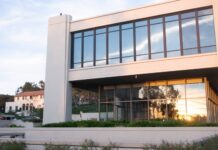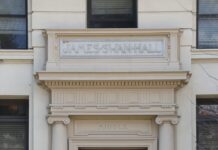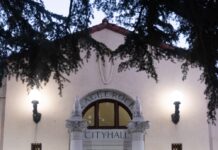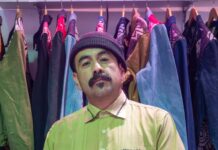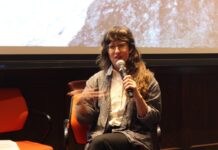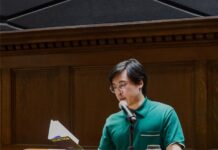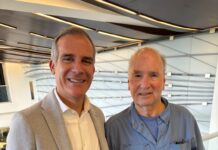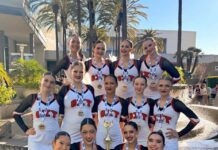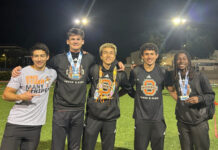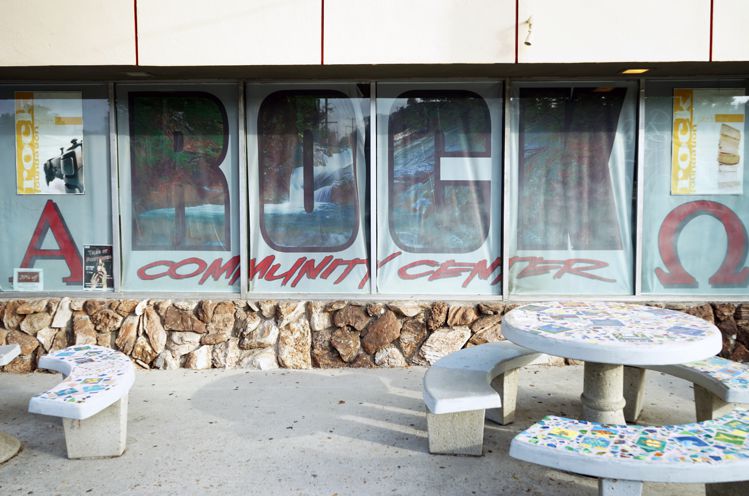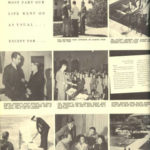Occidental touts its unique position as the only liberal arts college in Los Angeles to prospective students. That access to a rich urban community sounds great, but students do not always know the routes to becoming involved in the community. From fighting for Japanese-American students during World War II to leading writing workshops for formerly incarcerated youth, the college has an extensive history of advocacy for social justice issues in Los Angeles.
Assistant Dean for Community Engagement Ella Turenne was hired in 2010 to kick-start the Office of Community Engagement (OCE), in part, to uphold the college’s core values of community, service and a commitment to the public good. In the past six years, the department has grown and formed partnerships with the Center for Community Based Learning (CCBL), which works with faculty to incorporate a community-based education into their curriculum, and the Urban Environmental Policy Institute (UEPI), a nonprofit research advocacy institute on campus that encourages equity in Eagle Rock and across LA through social and environmental justice programs.
According to Program Coordinator for Partnership of Community Engagement Valerie Lizarraga, the OCE aims to promote positive social change by enabling students to get off campus and engage with Angelenos.
“The three offices [OCE, CCBL and UEPI] really try to have ongoing relationships with our community partners,” Lizarraga said. “We want to establish these long-term relationships in reciprocal, so our students are learning, or gaining, something, but really the community benefits from our relationship as well.”
The OCE has established enduring partnerships with numerous organizations across Los Angeles, including School on Wheels — a nonprofit that gives homeless children in Southern California access to education. The OCE also works alongside Reach Our Community Kids (ROCK), a faith-based community center on Yosemite Drive that provides occupational training to local youths. Occidental students volunteer there annually during the MLK Day of Service and as part of after-school tutoring programs, and first years painted a mural at ROCK during an OxyEngage pre-orientation trip.
According to Turenne, an estimated 50 percent of the student body is involved in community engagement projects — whether it is through one of the 10 clubs that focus on community, through integrated classes that teach social responsibility or through programs sponsored directly by the OCE.
“My biggest goal is to link as many students with community partners, and have as many good projects going as possible,” Turenne said. “Whenever they [community partners] need something … they know they can call on us.”
The Neighborhood Partnership Program (NPP), an on-campus organization that links Occidental students with local high school students, hires both tutors and college advisors as a part of the federally funded Gaining Early Awareness and Readiness for Undergraduate Programs in Los Angeles (GEAR UP 4 LA). NPP attributes its success to the tireless efforts of its employees — all of whom work hard to motivate 14 to 18 year olds and get them excited about higher-level education. The organization adheres to Occidental’s mission statement by promoting community engagement and civic responsibility.
“These students tend to be low income, first generation,” NPP mentor Allen Chen (sophomore) said. “This program is really about connecting them to Oxy students, who are in college, and who have resources and access to a level of knowledge.”
This year NPP has shifted away from tutoring and on to college advising, a change spurred by the aging of the program’s younger advisees — many of whom have worked with NPP tutors since the ninth grade. These current juniors and seniors are in the midst of preparing for college. Occidental student advisors look over their personal statements and help them to tackle some of the more difficult prompts in the college application essays.
From college essays to chemistry homework to help with financial aid, NPP exposes middle and high school students to undergraduate life through programs like Look at College, that allow the students a first-hand glimpse at pursuing a bachelor degree.
The Office of Religious and Spiritual Life (ORSL) is a community-centered organization committed to promoting religious pluralism and interfaith respect on campus. ORSL hosts events and provides opportunities that focus on the intersection of spirituality and social justice issues.
“Our office runs a lot of different programs that help students think about how their personal, religious, spiritual, ethical, philosophical values can inform their choice of career and how they want to live their lives,” ORSL Director Susan Young said.
One of these programs includes the Values and Vocations Fellowship. Funded by the Angell Foundation, the fellowship was awarded to 14 students in Fall 2016 who worked eight–10 hours per week at a community organization of their choosing.
“The point of this fellowship is to create a space for students to think about how their commitment to social justice and community service can be informed by spirituality,” Young said.
All ORSL projects have some sort of social justice component to them; students have volunteered at elementary schools, homeless shelters and domestic violence shelters. After examining the data ORSL collected for their annual report, Young estimated that Occidental fellows spent 3,000 hours giving back to the community during the 2015–16 academic year.
“We like to think that we are creating opportunities for our students to consider the commitment to community service,” Young said. “But we’re also providing what can be a very invaluable resource to the community organizations, because these highly skilled, highly educated community activists from Occidental are working for these community organizations for free.”
ORSL also collaborates with the Office of Community Engagement (OCE) to sponsor Alternative Spring Break, a program that asks students to forgo their mid-semester holiday in the interest of exploring various community issues in Los Angeles. Each year, ORSL chooses a program that correlates with Occidental’s annual core theme; since the college is focused on urban arts this year, Young is planning an Alternative Spring Break that will examine the use of arts in the correctional system to support youth.
One notable Alternative Spring Break was the 2011 trip for six students to the Manzanar Internment Camp, which the government used to imprison Japanese-Americans — two thirds of whom were American citizens — during World War II. An ongoing discussion about marginalization and intolerance led to the following year’s focus on Islamophobia and the Muslim experience in America.
“Oxy has a really proud history of standing up to bigotry and prejudice,” Young said. “We thought we should help students explore our histories and institution, and also look at … what we can learn about marginalized communities and the reality of their lived experience today.”
InsideOUT Writers (IOW) is a nonprofit that provides a space for formerly incarcerated youth in Los Angeles to gather, write and reflect. Through the Office of Community Engagement (OCE), Occidental students facilitate creative writing workshops with the hope of reducing the recidivism rate of the participants. Writing gives IOW student volunteers the ability to connect with like-minded individuals and provides all participants an opportunity to share experiences and emotions in a healthy way.
“I think [IOW] gives Oxy students an incredible opportunity to get hands-on experience in an environment very different from that of Oxy’s and to be present for firsthand accounts of people who have dealt with a myriad of social justice issues,” Anisha Banerjee (senior), one of the student facilitators, said.
The Occidental student facilitators also host an annual open mic night on campus, giving IOW members the opportunity to collaborate with Occidental students. The event benefits all participants involved by allowing the Occidental and IOW communities to share and hear personal stories and first-hand accounts of social-justice issues.
Banerjee described working for IOW as a unique privilege.
“As a writer, I think I have simply learned more ways to express myself and feel more confident in pieces I write that are entirely based on my emotions and very personal to me. I think I have started to feel a little less vulnerable when sharing my own work,” Banerjee said.
Banerjee understands the importance of IOW students’ sharing personal narratives, acknowledging the support that can be found through connections made with peers.
“Our hope is that [IOW students] take away the fact that higher education is very much within their reach if that is the path they wish to pursue,” Banerjee said. “From the workshops, we hope that they feel listened to, acknowledged and validated for their feelings.”
The Special Collections and College Archives cull materials — such as rare books, artifacts and news clippings — that shed light on Occidental’s past. The college’s reaction to the forced relocation and subsequent internment of Japanese-Americans in 1942, for example, has been documented in its entirety by Special Collections. An online archive saved 180 letters written by Occidental President Remsen Bird, which detail his efforts to transfer the six Japanese-American Occidental students under his charge to relative safety across the country, in colleges located on the East coast.
Special Collections Librarian and College Archivist Dale Stieber described the sense of community responsibility that permeated the college during the 1940s, as students and faculty alike worked hard to evacuate their peers — ensuring their freedom in a time of intense xenophobia.
It can be easy to see Occidental as unchanging; a campus in stasis, compressed into four years of their experiences. Less than 30 years ago, however, the short trip down the academic quad, from the Marketplace to the library, presented a very different sight: two large crosses dominating Herrick Chapel’s exterior.
Although Presbyterians founded the college in 1887, Occidental has been a secular institute since 1910. During the 1980s, the administration recognized the crosses as a potential source of tension among different faiths and religious groups, who felt their voices were minimized on campus. After much debate, the two crosses were finally removed in 1990 and the building was renamed the Herrick Memorial Chapel and Interfaith Center, a change meant to appeal to the broad range of individuals on campus.
“We recognized that there were different sects and different ways of religious life,” Stieber said. “This was one of our larger moments for Occidental, in terms of diversity.”
Stieber is currently working with student activists to record the occupation of the Arthur G. Coons Administrative Center (AGC) last November. Special Collections focuses on student organizers because it wants to preserve instances of on-campus activism.
“When you get to it, the purpose of why we’re here is so that someone like yourself in a hundred years can say, ‘What are some of the significant events or activities that happened at Occidental College?’ ‘How did such and such evolve in their various missions and the evolution of our mission?’ ‘How did people live and behave?’” Stieber said.
Have a community involvement story to share? Email weekly@oxy.edu or tweet us @oxyweekly
[socialpoll id=”2397773″]
![]()



